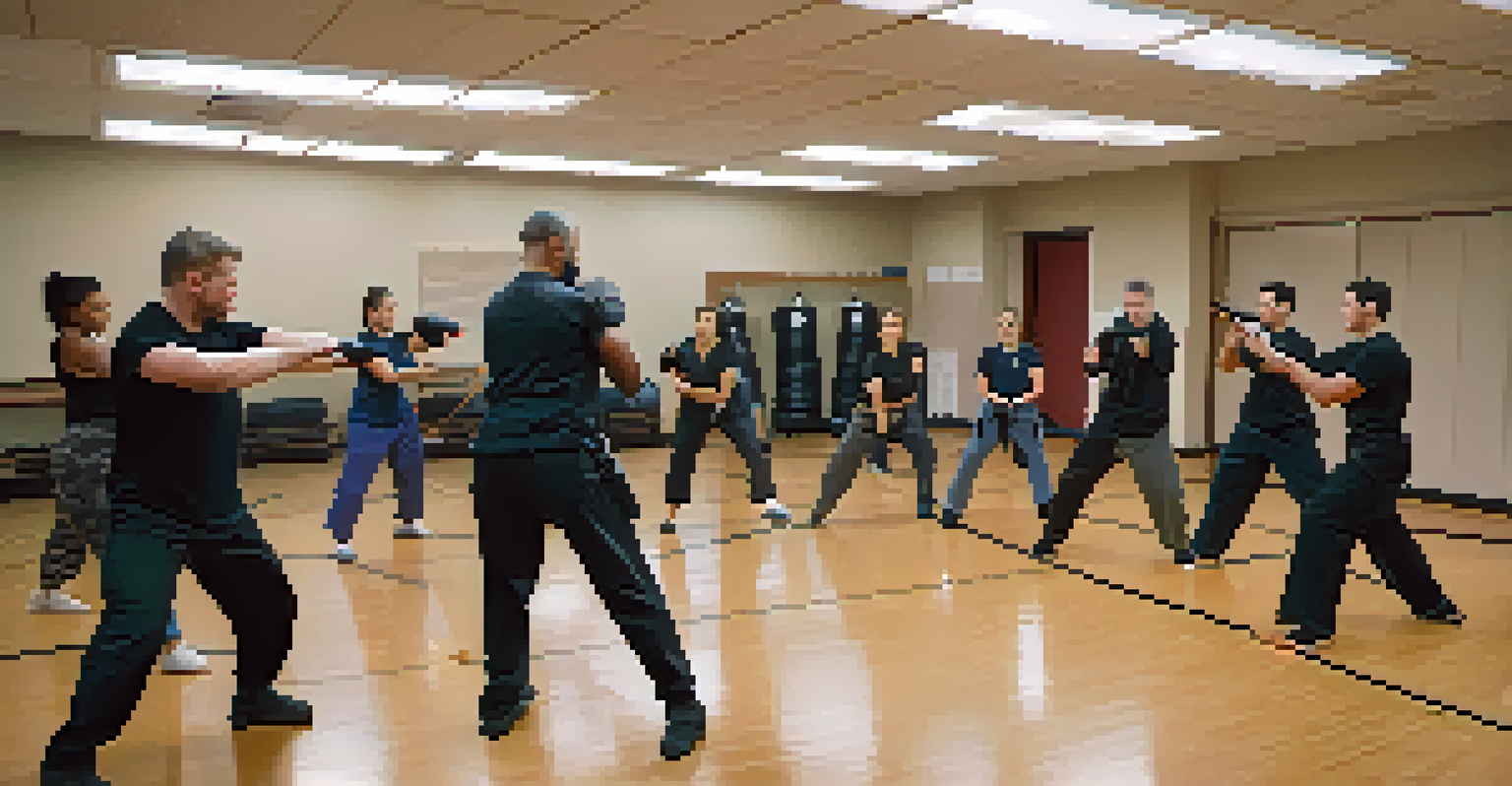The Legalities of Using Nontraditional Weapons for Defense

What Are Nontraditional Weapons and Their Uses?
Nontraditional weapons refer to tools not typically designed for combat, such as pepper spray, stun guns, or even household items like baseball bats. These items are often used for self-defense in situations where individuals feel threatened. The appeal lies in their accessibility and the perception that they can deter an attacker without resorting to lethal force.
Self-defense is not a right to kill. It is a right to protect oneself from harm.
The use of these weapons can be a gray area legally, depending on local laws and circumstances surrounding their use. For instance, while pepper spray is legal in many places, there may be restrictions on its size or strength. Understanding what qualifies as a nontraditional weapon is essential for anyone considering them for self-defense.
In practice, a nontraditional weapon can be a practical choice for self-defense, especially for those who prefer non-lethal options. However, the law often evaluates the situation, intent, and proportionality of response when determining legality.
Legal Framework Surrounding Self-Defense
Self-defense laws vary greatly from one jurisdiction to another, often dictating when and how individuals can use force against an attacker. Generally, the law allows for self-defense if a person reasonably believes they face imminent harm. However, the definition of 'reasonable belief' can be subjective, leading to potential legal complications.

In many places, the laws also differentiate between lethal and non-lethal force, which is crucial when considering nontraditional weapons. The principle of proportionality is key; the force used in self-defense should not exceed what is necessary to prevent harm. For example, using pepper spray against an unarmed assailant may be viewed as justifiable, while using a bat could be seen as excessive.
Understanding Nontraditional Weapons
Nontraditional weapons, like pepper spray and household items, are often used for self-defense but come with legal complexities.
It’s important for individuals to educate themselves about their local laws regarding self-defense. Not understanding these nuances can lead to serious legal repercussions, even when the intent was to protect oneself.
Consequences of Misusing Nontraditional Weapons
Using a nontraditional weapon inappropriately can lead to criminal charges, even if the intent was self-defense. For instance, if someone uses pepper spray in a non-threatening situation, they could face assault charges. This highlights the importance of understanding the context and intent behind using any self-defense tool.
The best defense is a good offense. But the best offense is to avoid the fight altogether.
Additionally, there can be civil consequences, such as lawsuits from the individual who was attacked. Even if you feel justified in your actions, the legal system may not always agree, leading to costly legal battles and emotional distress. Therefore, it's vital to consider the repercussions of any defensive action before resorting to nontraditional weapons.
Understanding these potential consequences can help individuals make informed decisions about how to react in dangerous situations. Awareness of the legal landscape allows for better judgment, ensuring that self-defense remains a justified response.
The Importance of Proper Training
Proper training is critical when it comes to using nontraditional weapons effectively and legally. Training can provide individuals with the skills necessary to de-escalate situations before they turn violent, reducing the need to resort to physical defense. Many self-defense classes also cover the legal implications of using force, which is invaluable knowledge.
For example, learning how to effectively use pepper spray involves not only how to deploy it but also understanding when its use is appropriate. Training can also help individuals recognize potential threats and make better decisions about when to engage or retreat. This not only improves personal safety but also ensures compliance with legal standards.
Legal Implications of Self-Defense
Self-defense laws vary widely and emphasize the importance of proportionality and understanding local regulations.
Investing time in training can make a significant difference in high-pressure situations. Being prepared can lead to more confident and measured responses, decreasing the likelihood of unintended legal consequences.
Variations in Laws by Region or Country
Laws governing the use of nontraditional weapons can differ significantly not only from state to state but also from country to country. For example, while pepper spray is legal in many U.S. states, it is banned or heavily regulated in others. International travelers must familiarize themselves with the laws of their destination to avoid legal trouble.
In some countries, even items considered nontraditional in the U.S. may be classified as weapons and come with strict legal ramifications. This discrepancy can lead to confusion, especially for individuals who may be accustomed to different legal standards regarding self-defense. Therefore, it is crucial to conduct thorough research before traveling with any defensive items.
Understanding these legal variations is essential for anyone considering nontraditional weapons for defense. Awareness fosters responsible ownership and use, ensuring that individuals remain within the bounds of the law regardless of their location.
Ethical Considerations in Using Nontraditional Weapons
Beyond the legalities, there are ethical considerations when using nontraditional weapons for self-defense. The decision to use such items should not be taken lightly, as they can cause harm even if intended as a means of protection. Reflecting on the potential outcomes can help individuals navigate these moral dilemmas.
For instance, using a stun gun may incapacitate an attacker, but it can also lead to unintended consequences, including legal ramifications or even serious injury to the assailant. Ethical considerations prompt individuals to think critically about their choices and the potential impact on all parties involved. This perspective encourages a more thoughtful approach to self-defense.
Ethical Considerations in Defense
Using nontraditional weapons raises ethical questions that require careful consideration of potential harm and consequences.
Ultimately, understanding the ethical implications helps create a safer environment for everyone. By prioritizing non-violent resolutions and considering the broader context, individuals can make more responsible decisions about self-defense.
Future Trends in Nontraditional Defense Weapon Legislation
As society evolves, so too does the legislation surrounding nontraditional weapons. Recent trends indicate a growing acceptance of non-lethal self-defense options, driven by public demand for safer communities. This shift could lead to more favorable laws regarding the possession and use of items like pepper spray and personal alarms.
However, with advancements in technology, new types of nontraditional weapons are emerging, such as smart self-defense tools equipped with tracking features. This raises questions about regulation, safety, and ethical use, prompting lawmakers to reconsider existing frameworks. Staying informed about these developments is essential for anyone interested in self-defense.

The future of nontraditional weapon legislation could significantly impact personal safety strategies. Engaging in discussions about these changes can empower individuals to advocate for laws that balance personal safety with community well-being.